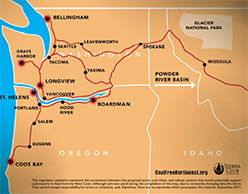This one hour webinar, which is part of the Hot Topics series, reviews coal’s life cycle and discusses how the mining, transportation, burning, and waste management of it adversely influences human and environmental health. Presenter Steven G. Gilbert, PhD, DABT also discusses the neighborhood impacts of coal trains including: train traffic and ship traffic, noise pollution, vehicle and pedestrian injuries, potential delays in emergency response, and how communities are organizing around these issues.
Learning Objectives
- Describe the various health consequences of coal
- List several of the contaminants of coal and the health consequences
- Describe the health effects of transporting coal in Washington State
Intended Audience
Local, state, and tribal public health practitioners, public health nurses, concerned community members living near coal routes, terminals, or coal fired power plants, anyone concerned about children's health and sustainability
Presenter
Steven G. Gilbert, PhD, DABT, Director and Founder of the Institute of Neurotoxicology and Neurological Disorders (INND), has a Ph.D. in toxicology and is a Diplomat of the American Board of Toxicology. He is an Affiliate Professor in the Department of Environmental and Occupational Health Sciences at the University of Washington. Gilbert's research has focused on neurobehavioral effects of low-level exposure to lead and mercury on the developing nervous system.
